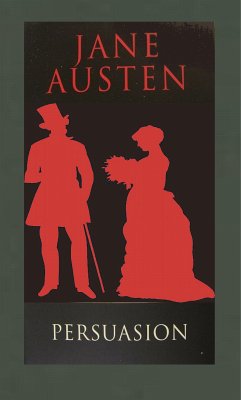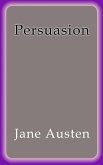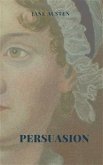Persuasion is Jane Austen's last completed novel, published posthumously. She began it soon after she had finished Emma and completed it in August 1816. Persuasion was published in December 1817, but is dated 1818. The author died earlier in 1817. As the Napoleonic Wars come to an end in 1814, Admirals and Captains of the Royal Navy are put ashore, their work done. Anne Elliot meets Captain Frederick Wentworth after seven years, by the chance of his sister and brother-in-law renting her father's estate, while she stays for a few months with her married sister, living nearby. They fell in love the first time, but she broke off the engagement. Besides the theme of persuasion, the novel evokes other topics, with which Austen was familiar: the Royal Navy, in which two of Jane Austen's brothers rose to the rank of admiral; and the superficial social life of Bath. It is portrayed extensively and serves as a setting for the second half of Persuasion. In many respects, Persuasion marks a break with Austen's previous works, both in the more biting, even irritable satire directed at some of the novel's characters and in the regretful, resigned outlook of its otherwise admirable heroine, Anne Elliot, in the first part of the story. Against this is set the energy and appeal of the Royal Navy, which symbolises for Anne and the reader the possibility of a more outgoing, engaged, and fulfilling life, and it is this worldview which triumphs for the most part at the end of the novel. Persuasion is linked to Northanger Abbey not only by the fact that the two books were originally bound up in one volume and published together, but also because both stories are set partly in Bath, a fashionable city with which Austen was well acquainted, having lived there from 1801 to 1805. Jane Austen Jane Austen (16 December 1775 – 18 July 1817) was an English novelist whose works of romantic fiction, set among the middle classes and landed gentry, earned her a place as one of the most widely read writers in English literature. Her literary realism was often represented as biting irony and satirical commentary, directed partly at the landed British aristocracy. Austen lived her entire life as part of a close-knit family located on the lower fringes of the English landed gentry. She was educated primarily by her father and older brothers as well as through her own reading. The steadfast support of her family was critical to her development as a professional writer. From 1811 until 1816, with the publication of Sense and Sensibility (1811), Pride and Prejudice (1813), Mansfield Park (1814) and Emma (1815), she achieved success as a published writer. She wrote two additional novels, Northanger Abbey and Persuasion, both published posthumously in 1818, and began another one, which was eventually titled Sanditon, but died before completing it. Austen's works critique the novels of sensibility of the end of the 18th century and are part of the transition to 19th-century literary realism. Her plots, though fundamentally comic,highlight the dependence of women on marriage to secure social standing and economic security. Her works, though usually popular, were first published anonymously and brought her little personal fame and only a few positive reviews during her lifetime. The publication in 1869 of her nephew's A Memoir of Jane Austen introduced her to a wider public, and by the 1940s she had become widely accepted in academia as a great English writer. The second half of the 20th century saw a proliferation of Austen scholarship and the emergence of a Janeite fan culture.
Bitte wählen Sie Ihr Anliegen aus.
Rechnungen
Retourenschein anfordern
Bestellstatus
Storno









